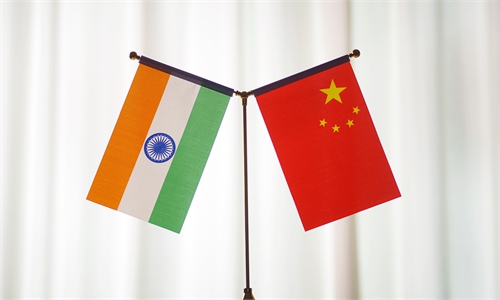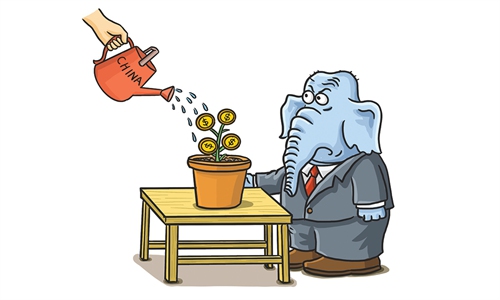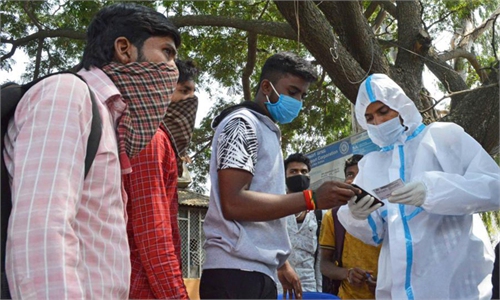COMMENTS / EXPERT ASSESSMENT
China’s return as India’s top trader blow against nationalism

Illustration: Tang Tengfei/GT
China returned as the largest trading partner of India in 2020 - an extreme year for bilateral relations as New Delhi recklessly adopted a speculative approach to antagonize China from border disputes to economic frictions. The so-called "decoupling China" policy has clearly failed and turned out as a rebuke toward Indian nationalism.Bilateral trade between China and India totaled at $77.7 billion in 2020. Replacing the US, China regained the top position as India's largest trading partner, with the bilateral trade gap accounting for the largest portion at almost $40 billion of the South Asian country's trade deficit, Bloomberg reported, citing Indian official data.
The result was actually nothing beyond expectation. Facing India's ill-intended provocation in economic areas, from blocking Chinese investment to banning Chinese apps, Beijing did not roll out countermeasures which would definitely devastate some Indian industries, especially those rely heavily on Chinese supplies, such as India's pharmaceutical sector.
Not only raw materials, China-made products enjoy comprehensive advantages in the South Asian market, with high cost performance comparing to products from other international suppliers. Despite there are obstructions, it is the economic rules fundamentally determine choices of producers as well as consumers.
For instance, Chinese smart phone brands recorded a market share expansion in India in 2020 even amidst the hostile atmosphere, accounting for as much as 77 percent of the total market, per industrial report by Canalys Research. Other sectors such as heavy machinery and home appliances are also products meeting India's rigid demand, and nearly impossible to find alternative suppliers.
The cost-effective Chinese products have contributed to the development of Indian industries, with lower costs and higher efficiency. However, some Indian politicians and media have been complaining, under the guise of market entrance rules for certain industries, about its trade deficit against China. The truth is even without any market entrance rules, it is impossible for India to close the trade gap with China within its current industrial structure. And it is essentially the different economic structures of the two economies that determined the trade performance.
Instead of tangling in wrong cognition about the trade deficit or recklessly trying to narrow the gap by political interference or hyping up nationalism, the right solution for New Delhi is to better integrate into regional value chain, such as joining the Regional Comprehensive Economic Partnership (RCEP), so as to gradually improve its industrial structure, which is also in line with its currently stagnated Make-in-India campaign.
The two Asian emerging economies enjoy complementarities which have been proved again by the trade data. Besides the growing trade, Chinese capital has been investing throughout the South Asian market, facilitating industrial development and creating local jobs.
Heavily battered by the COVID-19 pandemic, Indian economy was estimated by the IMF to register a drastic 8 percent contraction in 2020-21 fiscal year, but the challenges facing by India economy rooted much deeper than the virus fallout. The largest South Asian economy had witnessed slowing down growths before the outbreak.
To relief the mounting economic pressure and boost recovery, resuming a benign economic and trade tie with China will be a crucial path for Modi administration under such circumstances. Recently it has reportedly begun clearing foreign direct investment proposals from China after about nine months of suspension. However, rebuilding trust and reputation for global investors will not be a swift course. New Delhi needs to show its sincerity and make genuine moves to offer a stable and secure policy environment for trade and economic exchange.
The article was compiled on an interview with Liu Zongyi, secretary-general of the Research Center for China-South Asia Cooperation at Shanghai Institutes for International Studies. bizopinion@globaltimes.com.cn



